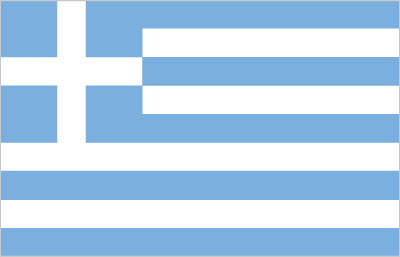Capital City: Athens
Population: 10,775,557 (July 2014 est)
Currency: Euros (EUR)
Land Area: 131,957 sq km. Strategic location dominating the Aegean Sea and southern approach to Turkish Straits; a peninsular country, possessing an archipelago of about 2,000 islands.
Dominant Religions: Greek Orthodox (official) 98%, Muslim 1.3%, other 0.7%
Land Boundaries: Albania 282 km, Bulgaria 494 km, Turkey 206 km, Macedonia 246 km
Location: Southern Europe, bordering the Aegean Sea, Ionian Sea, and the Mediterranean Sea, between Albania and Turkey
Climate: Temperate; mild, wet winters; hot, dry summers
Terrain: Mostly mountains with ranges extending into the sea as peninsulas or chains of islands
Visa: Greece is a member of the Schengen Agreement. There are no border controls between countries that have signed and implemented this treaty – the European Union (except Bulgaria, Croatia, Cyprus, Ireland, Romania and the United Kingdom), Iceland, Liechtenstein, Norway and Switzerland. Likewise, a visa granted for any Schengen member is valid in all other countries that have signed and implemented the treaty
Entry Point: Kipoi (from Ipsala, Turkey)
Exit Point: Ktismata (to Kakavia, Albania)
Cuisine: Greek cuisine is a blend of indigenous traditions and foreign influences. Neighboring Italy and Turkey have left a major impact on Greek cuisine, and there are shared dishes with both of these nations. The traditional Greek diet is very Mediterranean, espousing vegetables, herbs, and grains native to the Mediterranean biome. Being a highly maritime nation, the Greeks incorporate plenty of seafood into their diet. The country is also a major producer and consumer of lamb; beef, pork, and especially chicken are also popular. Olive oil is a staple in Greek cooking, and lemon and tomatoes are common ingredients. Bread and wine are always served at the dinner table.

